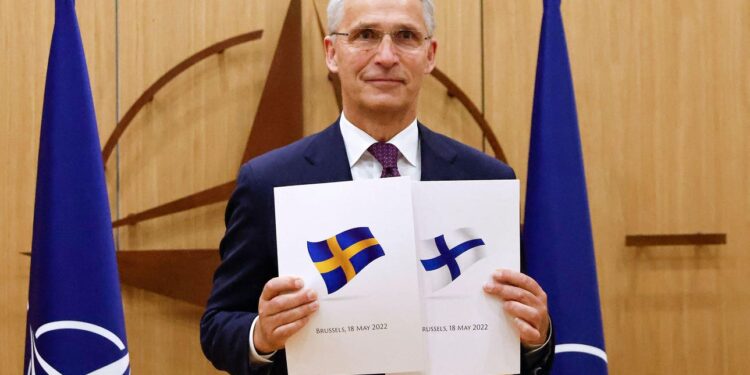TOPSHOT – NATO Secretary-General Jens Stoltenberg poses with application documents presented by … [+] Finland’s Ambassador to NATO Klaus Korhonen and Sweden’s Ambassador to NATO Axel Wernhoff during a ceremony to mark Sweden’s and Finland’s application for membership in Brussels, on May 18, 2022. – Finland and Sweden submitted their applications for NATO membership on May 18, 2022 and consultations were underway between the Allies to lift Turkey’s opposition to the integration of the two Nordic countries into the Alliance. (Photo by JOHANNA GERON / POOL / AFP) (Photo by JOHANNA GERON/POOL/AFP via Getty Images)
POOL/AFP via Getty Images
A week ago I started reading Admiral Jim Stavridis and Elliott Akerman’s second book, ‘2054’, which like the first (‘2034’) is a work of fiction designed to tell us about how our own world is evolving and the risks that will confront us. Without spoiling the plot, ‘2054’ demonstrates how new technologies can be deployed in nefarious ways, with the goal of turning the tide of geopolitics. However, as much as I enjoy the work of the Stavridis/Akerman team, my reaction to ‘2054’ was much the same as ‘2034’ (‘2034 – are we already there?’), which is that it has been rendered out of date by bizarre events in the real, political world
The detonation of over seventy years of American diplomacy and soft power by the various speeches and deeds of the Trump administration is a fin de siècle moment, that has drawn comment across the diplomatic world (the most pertinent was that of the Singaporean defence minister who described how he saw the USA moving from a force for ‘moral legitimacy’ to a landlord seeking rent’).
The worry now is that the US will treat its allies like enemies and its foes like friends. There was much consternation in Europe, but as this note has argued so many times, very few European countries have faced up to the challenges of the post-globalized world (Mario Draghi’s speech to the EU parliament last week put it very well…’do something!’).
There is now a furore over Eur 500 bn defence bonds, joint nuclear shields and defence equipment shopping lists. But, a more urgent task than buying fighter jets is the need for Europe to have a coherent security strategy. In a weekend where many are anticipating the results of the German election, a neglected development was the collapse of government formation talks between Austria’s centre-right OVP and the far-right FPO.
Some weeks ago, the parties had agreed on an economic programme, but could not settle on a common foreign policy, a critical stumbling point was oversight of the intelligence services (the OVP wanted to be in charge). This is a sensitive topic given that the FPO has a soft spot for the Kremlin, and specifically the fact that in 2018 the Herbert Kickl (FPO leader), when he was Austria’s interior minister, ordered an investigation into the country’s security services. Today, few of its EU peers share intelligence with Austria.
Reflecting that, the immediate challenge from Russia is infiltration, sabotage and manipulation across Europe (the Gerasimov doctrine and David Kilcullen’s work on Russian/Chinese tactics are both worth a read here ‘From Great War to Total War’). The EU has done relatively little to push back on this interference, and now has an urgent security (as well as defence) challenge.
This could take various forms.
The first is to penalise EU states that systematically go against the grain of the policies, values and interests of the Union. Hungary is the main offender here and whilst some EU funds have been withheld from Viktor Orban, the EU has in general failed to confront him. In the recent past there has been talk in the European parliament of excluding Hungary from the EU, which is technically difficult, but is a necessary part of a more ideologically consistent Europe, and one where bad actors face a penalty for their actions.
A second strand is to have much greater oversight over the movement of Russians in Europe, and of their capital. Vienna, Milan and the south of France, not to mention parts of Switzerland, are popular destinations for wealthy Russians and some European capitals are saturated with Russian money (Mark Hollingsworth’s book ‘Londongrad’ is instructive here as is Oliver Bullough’s ‘Butler to the World’). To emphasise the point, Russian interference in UK and lately Irish politics has not been aggressively countered, and my fear is that this is much worse in other countries like Germany.
Instead of clamouring to buy rocket launchers, Europe’s political classes have a lot to do domestically to shut the door on Russian interference in European affairs.
Then, on a more structural level, there is scope for much greater intelligence sharing across governments and joint task-forces on organised crime (gangs are a favourite extension of the Russian state). From the point of hardware, there is a need for increased joint use of satellites and electronic warfare collaboration.
The distinction between security and defence is an important and urgent one and a reminder of how complacent European governments have been. Whilst defence capabilities will take time to build up, the measures to be enacted in the security domain are less challenging to operationalise, but constitute a real test of European governments’ mettle.
Source link : http://www.bing.com/news/apiclick.aspx?ref=FexRss&aid=&tid=67b8a44ce9af42b3ac1ee8f366d87bd6&url=https%3A%2F%2Fwww.forbes.com%2Fsites%2Fmikeosullivan%2F2025%2F02%2F21%2Fwhat-does-europe-need-to-do-to-bolster-its-security%2F&c=14978824961077900436&mkt=de-de
Author :
Publish date : 2025-02-21 06:53:00
Copyright for syndicated content belongs to the linked Source.



